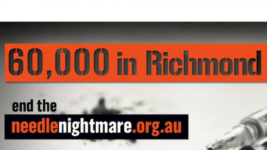Medically Supervised Injecting Centre to Open in Melbourne

In the wake of 34 deaths by overdose in the North Richmond local council area in 2015 alone, the Victorian state government responded to community calls for a safe injecting room late last year by approving a two-year trial.
Victoria’s first medically supervised injecting centre (MSIC) is scheduled to open within the next few days and its 11 rooms are expected to accommodate for up to 300 users per day.
Enabling legislation
The trial is enabled by the Drugs Poisons and Controlled Substances Amendment (Pilot Medically Supervised Injecting Centre) Bill 2017, which inserts a new Part VIAB into Victoria’s Drugs, Poisons and Controlled Substances Act 1981 (the Act).
Objectives of the centre
The new section 98C of the Act outlines the objectives of the MSIC, which are to:
- reduce the number of deaths from drug overdoses;
- provide a gateway to health and social assistance for clients of the licensed injecting centre, including drug treatment, health care and counselling;
- reduce drug overdose related ambulance attendances;
- educe the number of discarded needles and syringes
- and the incidence of drug injecting in public places;
- improve the amenity of the neighbourhood for residents and traders in the vicinity of the licensed injecting centre;
- assist in reducing the spread of blood-borne diseases, including but not limited to HIV infection or Hepatitis C.
Limited scope of trial
The new section 98B makes it clear that the law “allow[s] the responsible authority to issue only one licence, in respect of only one premises, to have effect only 30 during a trial period of 18 months starting on a day to be fixed by proclamation as the start of the trial period.”
Other sections impose a range of restrictions on the operation of the facility, and require data collection and reviews regarding whether the trial is fulfilling its stated objectives.
Like the Kings Cross MSIC in New South Wales, the amendments create exemptions from prosecution while in possession of small quantities of drugs in the centre, and a window whereby police can exercise their discretion not to prosecute low level drug possession around the centre.
Kings Cross MSIC
The trial follows in footsteps of the successful Kings Cross MSIC in Sydney, which opened its doors in May 2001.
An evaluation of the centre found that it has prevented over 6,000 overdoses since its inception, lowered ambulance call-outs in the area by 80%, helped to clean up the local area – where used syringes were previously found in large numbers in parks, on footpaths and on the streets, and reduced the transmission of blood-borne viruses such as HIV and Hepatitis C.
As the centre’s Dr Marianne Jauncey has pointed out, there’s never been a fatal overdose at any of the 90-odd safe injecting facilities around the world – including of course Kings Cross.
The centre has also increased user engagement in support and education programs.
The annual cost of Sydney’s MSIC is $3 million, which has been described as “nothing compared to the billions currently spent on enforcement”, and is estimated to have saved tens of millions of dollars in public health costs.
Law in NSW
The NSW centre was enabled by Part 2A of the Drugs Misuse and Trafficking Act 1985
Section 36E(1) of that Act (now repealed) stated, “The responsible authorities (the Commissioner of Police and the Directior General of the Department of Health) may issue a licence authorising the holder of the licence to conduct specified premises as an injecting centre.”
Under section 36F, the responsible authority must be satisfied of the following matters in order to extend a licence:
- that the internal management protocols for the proposed centre have been finalised and are of a satisfactory standard, and
- that there is a sufficient level of acceptance, at community and local government level, for the establishment of an injecting centre at the premises, and
- that the premises are suitable for use as an injecting centre, having regard to all relevant matters including the following:
- public health and safety,
- the visibility of the premises from the street,
- the proximity of the premises to schools, child care centres and community centres,
- any matters prescribed by the regulations for the purposes of this
Users are exempted from criminal liability under Section 36N, as long as they only possess and use a small quantity of a prescribed drug.
Response to Victorian centre
The Law Institute of Victoria Criminal Law section has strongly supports the centre, emphasising the social and economic costs of harm minimization
Tania Wolff, whose practice First Step Legal runs a not-for-profit health, mental health and addiction service, says the success of MSICs across the globe demonstrate that harm minimisation is much more effective in all respects than criminalisation.
“Drug addiction is a health issue not a criminal issue, and has to be dealt with as such,” Ms Wolff states. “In Victoria we are losing more people to overdoses than to our road toll… Clearly the law and order response is not doing a great job of dealing with substance abuse.”
However, there are also the usual conservative voices who express the view that such centres are undesirable as they send out a message that drug use is permissible.







